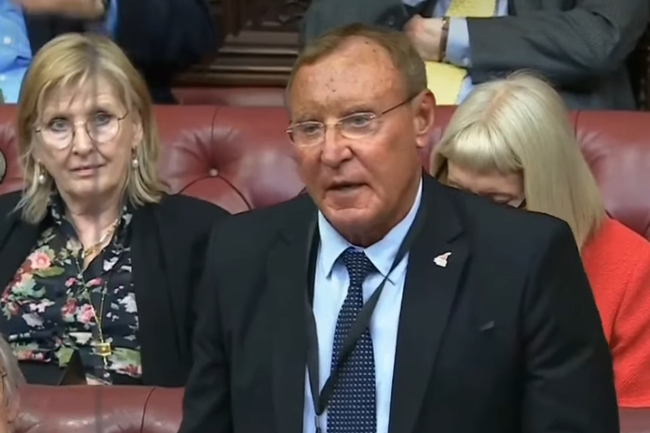Lords urge Government to ratify agreement with Cuba
Campaign News | Wednesday, 26 March 2025

Lord Tony Woodley asking a question on Cuba in the House of Lords
Members of the House of Lords urged the Government to ratify an agreement signed between Cuba and the UK, and raised concerns about the extraterritorial impact of the blockade in Parliament on Tuesday 25 March.
A wide ranging discussion on the impact of the US blockade on British business, lessons from the Cuban health care system, and the continued occupation of Cuban land at Guantánamo took place when peers questioned the Deputy Leader of the House of Lords on Cuba policy.
Lord Tony Woodley (Labour) asked Lord Collins of Highbury, “what steps” the Government had taken to ratify the United Kingdom-Cuba Political Dialogue and Cooperation Agreement which was signed under the previous government in November 2023.
In response, Collins, who is also the Parliamentary Under-Secretary of State (Foreign, Commonwealth and Development Office), said that the agreement was “currently undergoing cross-government consultation and will be laid before Parliament for scrutiny in due course.”
Woodley urged the Government to speed up the process to help Cuba in its current economic crisis: “Every day is a terrible delay in terms of the suffering that it leaves the Cuban people in. Can I therefore press him further on when he anticipates that this agreement will be ratified, bearing in mind that, as he said, the previous Government travelled to Havana to sign it? I urge my noble friend to consider provisional implementation beforehand, in line with what the EU is doing, as a vital means of breaking the isolation of this very peaceful Caribbean island.”
Several other members also pressed the government on the issue. Lord Purvis of Tweed, Liberal Democrat Lords Spokesperson on international trade, development and foreign affairs questioned the length of time it was taking to ratify the agreement: “Eighteen months seems a little long for internal government consultation on an agreement signed by a Minister of the Crown. Part of the agreement, as Minister Rutley said when he signed it, was about the US embargo—and now we have seen the most recent restrictions by the Trump Administration.”
Lord Collins replied that he was unable to specify a time for ratification, nor were there plans for provisional implementation, but that “positive collaboration with Cuba is possible without it, as evidenced by the recent visit to Havana by United Kingdom climate experts.”
Labour’s Lord Sahota wanted to know if the British Government’s close relations with Donald Trump would encourage them to “ask the President of America for Americans to leave Guantánamo Bay, which is something that the Cuban Government have wanted them to do for the last 60 years.” Describing the occupied Cuban land as “a sovereign base for the US,” Collins said that he would not be raising the issue with US authorities.
The impact of the US blockade on British business was raised by Conservative peer Lord Balfe, who said that the US policy “has made it more difficult for British business to intervene and get orders” from Cuba. “What steps is the Minister going to take to mitigate the challenges of the embargo, with things as they stand at the moment, to enable UK businesses to engage more with Cuba and sell more products to Cuba?”, he asked.
Collins acknowledged the impact both on British business, as well as economic development and living standards in Cuba. He reminded the Lords that the UK had voted against the blockade at the United Nations every year since 1996. He also referred to the restrictions that Titles III and IV of the US Helms-Burton Act placed on British companies, preventing them from “conducting legitimate and lawful business in Cuba. We have made representations in that regard, and we are absolutely concerned about the ongoing impact on the economic development of British companies and companies within Cuba.”
Labour’s Lord Sikka used the opportunity to praise the number of doctors in Cuba compared to the UK and asked whether the government would draw any lessons from the country: “Cuba, a comparatively poor country, has 9.31 doctors per 1,000 people and exports medical professionals. The UK has 3.2 doctors per 1,000 people, well below the EU average, and struggles to produce doctors; it has imported 32% of its doctors. On the assumption that we can all learn from other countries, will the Government study Cuba’s health system and seek its help in addressing doctor shortages in the UK?”
Rob Miller, CSC director said “It is great to see parliamentarians pressing for greater engagement with Cuba. While the United States continues its policies of aggression and isolation it is essential that the British Government makes clear its opposition to those policies not just at the annual vote at the UN, but with practical steps to encourage trade and exchange between Britain and Cuba. The Government must put Lord Collins’ words into actions by ratifying the Political Dialogue and Cooperation Agreement, and being more robust in defending organisations that want to trade and work with Cuba from extraterritorial sanctions from the US Treasury and State Department.”






